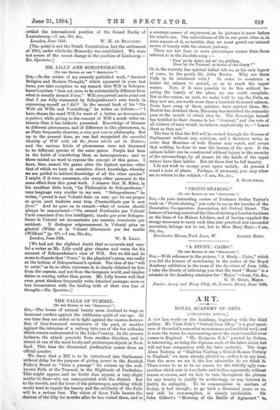MR. LILLY AND SCHOPENHAUER.
[To THE EDITOR OF THE " SPECTATOR SIR,—In the review of my recently published work, "Ancient Religion and Modern Thought," which appeared in your last issue, you take exception to my remark that Will in Schopen- lianer's system " does not seem to be substantially different from what is usually termed Force." Will you permit me to point out that I am fully warranted by Schopenhaner's own words in expressing myself as I did P In the second book of his "Die Welt ale Wine and Vorstellung," he writes as follows :—"I have chosen the word Will for want of a better, as denominatio
• apotiori, while giving to the concept of Will a much wider ex- tension than it has hitherto possessed. Knowledge of likeness in different phenomena, and of difference in like phenomena, is, as Plato frequently observes, a sine puft non in philosophy. But Tip to the present time, no one had recognised the essential identity of Will with all the forces which act in Nature; and the various kinds of phenomena were not discerned to be different species of the same genus. People had been in the habit of considering them as heterogeneous ; and so there existed no word to express the concept of this genus. I have, then, named the genus after the highest species—after that of which we have in ourselves direct knowledge, whereby we are guided to indirect knowledge of all the other species." I might, if it were necessary, cite many other passages to the same effect from this great work. I observe that M. Ribot, in his excellent little book, "La Philosophie de Schopenhaner," uses language very similar to my own. " Schopenhaner," he writes, " prend le mot Volonte dana nn sens qui lui est propre et qu'on pent tradnire sans trop d'inexactitnde par le mot force." And he goes on to remark—what of course should always be remembered—" On entend d'ordinaire par Volonte I'acte conscient d'nn titre intelligent; tandis que pour Schopen- tamer la Volonte eat inconsciente par essence, consciente par accident. Il distingne soignensement la Volonte prise en general (Willa) et la Volonte determinee par des motifs (Winker) " (p. 67).—I am, Sir, ere., [We had not the slightest doubt that so accurate and care- ful a writer as Mr. Lilly could give chapter and verse for his account of Schopenhaner's view of Will. But we did and do mean to dispute that "Force," in the physicist's sense, was really at the bottom of Schopenhaner's system. The idea of the "will to exist," as he so often expresses it, is clearly obtained by him from the organic, and not from the inorganic world, and implies desire or craving rather than power. Mr. Lilly knows well that even great thinkers frequently write detached passages more or less inconsistent with the leading drift of their own line of thought.—ED. Spectator.]


































 Previous page
Previous page